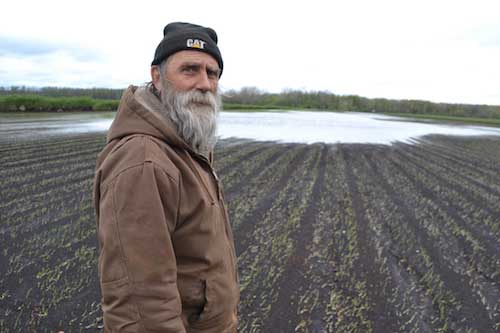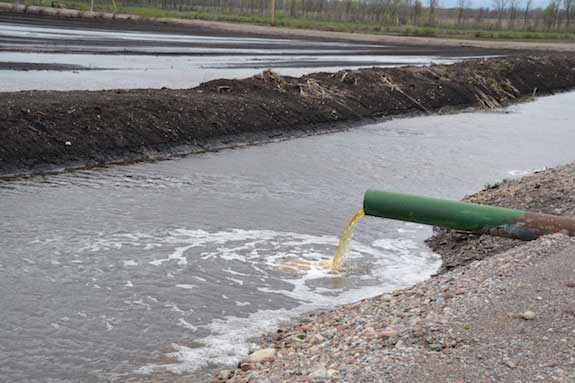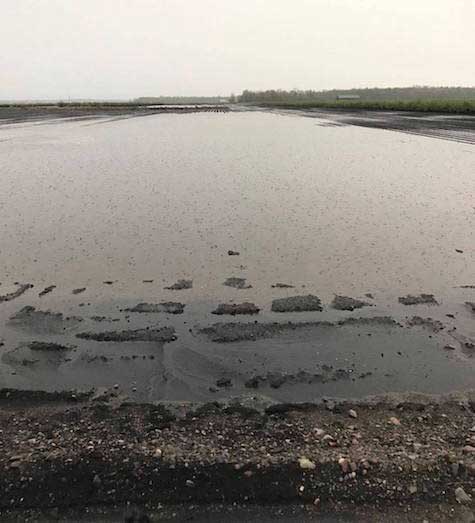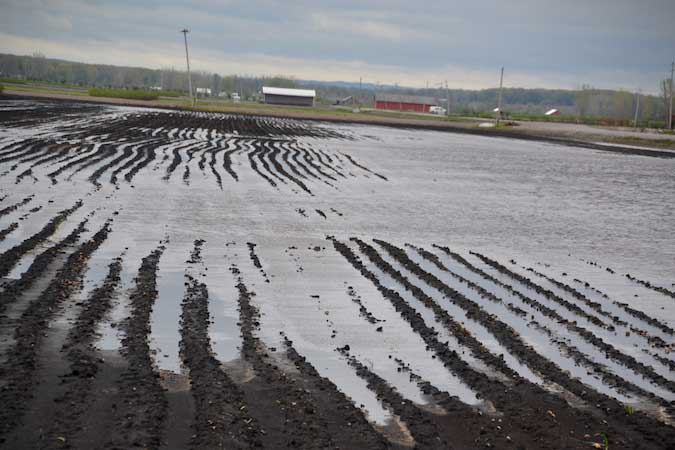With more rain in forecast, muck farmers worry about their crop
Mucklands are at saturation point after deluge

Joe Bezon stands in one of his fields in Clarendon on Tuesday evening. Bezon said the water has gone down significantly since the storm on Monday. He worries about the forecast that calls for one to two inches more of rain from Thursday to Friday.
CLARENDON – Joe Bezon, a third-generation muck farmer, had just headed home after a hard day’s work on Monday afternoon when it started raining. A sprinkle soon turned into a deluge.
Bezon’s home in Byron was pounded by the rain. He drove to the muck and saw water, everywhere. Bezon was about 75 percent done planting onions for the season. Now there was standing water in the fields.
Bezon said about an inch of rain fell at his house, and 2 inches in the muck.
Bezon and the muck farmers were able to pump lots of the water off the muck on Tuesday, leaving them optimistic the plants and seeds would survive. But he is nervous about the forecast for Thursday, which says another inch to 2 inches is headed our way.
“The water has gone down a lot,” he said Tuesday evening on the muck. “It all depends on Thursday and the through the weekend. It’s wait and see what happens next. It looks like another 10 days of poor weather.”
Another big rain and farmers will struggle to get rid of the water. Bezon said the ground is saturated and the drainage ditches at near capacity.

The drainage ditches are getting full in the muck.
Bezon’s grandfather was one of the original muckers in the 1920s. Bezon, 60, said there has been years when the entire crop was lost due to the weather.
Last year there was little rain after May, but Bezon and other farmers on the muck made up for it by irrigating. Bezon said he had one of his best crops ever last year.
But too much rain is hard to deal with. Even if some of the water is pumped into ditches, Bezon said farmers can’t get back in the field for perhaps a week or more to spray for weeds because their equipment would get stuck.

Sandy Bezon took this photo on Monday evening after a big rainstorm on the muck. A lot of the water has since been pumped out of the fields.
Bezon farms 110 acres in the muck and was 75 percent done with planting at about $2,500 per acre. There is a chance the seeds and plants may not survive the flooding. Bezon said planting again, at $2,500 per acre, means extra work with likely no profit.
Triple G Farms is about 85 percent of way done with planting onions on about 200 acres. Co-owner Guy Smith said the farm has little standing water in its fields, but he is concerned about the forecasted rain.
“Right now we’re pretty good,” he said. “But it will be hard if we get more rain.”
One rain gauge on the muck showed 1.25 inches of rain on Monday, May 1. That followed 6 inches in April. That is far more than usual on the muck.
In April 2016, rain totaled 1.4 inches. Previous April rain amounts include: 3.2 inches in 2015; 5 inches in 2014; 4.2 inches in 2013; and 1.8 inches in 2012, according to the Cornell Vegetable Program.
Bezon said the rainfall so far this year is a start contrast from 2016.
“Last year we prayed for rain,” he said. “Now we have all the pumps running. The ground is saturated.”
Muck farmers set May 10 as a goal to have their crop planted. The corn and soybean farmers set June 10 as a deadline. After those days, the yields tend to diminish 1 to 2 percent each day the crop is planted after the target dates.
The big rains and wet fields could keep farmers from planting for a week or more, even if the rain stopped.
“We still have time because farmers have bigger equipment these days and can cover a lot of ground,” said Larry Meyer, the Farm Service Agency director in Orleans County. “These guys are amazing and can get a tremendous amount of work done. They work around the clock.”
But Meyer said they can’t plant the crop in waterlogged fields.
“The main thing with agriculture and rain is when is it going to stop?” Meyer said.






































































